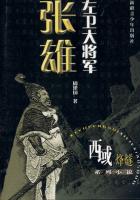Not with so fierce a rage the foaming flood Roars, when he finds his rapid course withstood;Bears down the dams with unresisted sway, And sweeps the cattle and the cots away.
These eyes beheld him when he march'd between The brother kings: I saw th' unhappy queen, The hundred wives, and where old Priam stood, To stain his hallow'd altar with his brood.
The fifty nuptial beds (such hopes had he, So large a promise, of a progeny), The posts, of plated gold, and hung with spoils, Fell the reward of the proud victor's toils.
Where'er the raging fire had left a space, The Grecians enter and possess the place.
"Perhaps you may of Priam's fate enquire.
He, when he saw his regal town on fire, His ruin'd palace, and his ent'ring foes, On ev'ry side inevitable woes, In arms, disus'd, invests his limbs, decay'd, Like them, with age; a late and useless aid.
His feeble shoulders scarce the weight sustain;Loaded, not arm'd, he creeps along with pain, Despairing of success, ambitious to be slain!
Uncover'd but by heav'n, there stood in view An altar; near the hearth a laurel grew, Dodder'd with age, whose boughs encompass round The household gods, and shade the holy ground.
Here Hecuba, with all her helpless train Of dames, for shelter sought, but sought in vain.
Driv'n like a flock of doves along the sky, Their images they hug, and to their altars fly.
The Queen, when she beheld her trembling lord, And hanging by his side a heavy sword, 'What rage,' she cried, 'has seiz'd my husband's mind?
What arms are these, and to what use design'd?
These times want other aids! Were Hector here, Ev'n Hector now in vain, like Priam, would appear.
With us, one common shelter thou shalt find, Or in one common fate with us be join'd.'
She said, and with a last salute embrac'd The poor old man, and by the laurel plac'd.
Behold! Polites, one of Priam's sons, Pursued by Pyrrhus, there for safety runs.
Thro' swords and foes, amaz'd and hurt, he flies Thro' empty courts and open galleries.
Him Pyrrhus, urging with his lance, pursues, And often reaches, and his thrusts renews.
The youth, transfix'd, with lamentable cries, Expires before his wretched parent's eyes:
Whom gasping at his feet when Priam saw, The fear of death gave place to nature's law;And, shaking more with anger than with age, 'The gods,' said he, 'requite thy brutal rage!
As sure they will, barbarian, sure they must, If there be gods in heav'n, and gods be just-Who tak'st in wrongs an insolent delight;With a son's death t' infect a father's sight.
Not he, whom thou and lying fame conspire To call thee his- not he, thy vaunted sire, Thus us'd my wretched age: the gods he fear'd, The laws of nature and of nations heard.
He cheer'd my sorrows, and, for sums of gold, The bloodless carcass of my Hector sold;Pitied the woes a parent underwent, And sent me back in safety from his tent.'
"This said, his feeble hand a javelin threw, Which, flutt'ring, seem'd to loiter as it flew:
Just, and but barely, to the mark it held, And faintly tinkled on the brazen shield.
"Then Pyrrhus thus: 'Go thou from me to fate, And to my father my foul deeds relate.
Now die!' With that he dragg'd the trembling sire, Slidd'ring thro' clotter'd blood and holy mire, (The mingled paste his murder'd son had made,)Haul'd from beneath the violated shade, And on the sacred pile the royal victim laid.
His right hand held his bloody falchion bare, His left he twisted in his hoary hair;Then, with a speeding thrust, his heart he found:
The lukewarm blood came rushing thro' the wound, And sanguine streams distain'd the sacred ground.
Thus Priam fell, and shar'd one common fate With Troy in ashes, and his ruin'd state:
He, who the scepter of all Asia sway'd, Whom monarchs like domestic slaves obey'd.
On the bleak shore now lies th' abandon'd king, A headless carcass, and a nameless thing.
"Then, not before, I felt my cruddled blood Congeal with fear, my hair with horror stood:
My father's image fill'd my pious mind, Lest equal years might equal fortune find.
Again I thought on my forsaken wife, And trembled for my son's abandon'd life.
I look'd about, but found myself alone, Deserted at my need! My friends were gone.
Some spent with toil, some with despair oppress'd, Leap'd headlong from the heights; the flames consum'd the rest.
Thus, wand'ring in my way, without a guide, The graceless Helen in the porch I spied Of Vesta's temple; there she lurk'd alone;Muffled she sate, and, what she could, unknown:
But, by the flames that cast their blaze around, That common bane of Greece and Troy I found.
For Ilium burnt, she dreads the Trojan sword;More dreads the vengeance of her injur'd lord;Ev'n by those gods who refug'd her abhorr'd.
Trembling with rage, the strumpet I regard, Resolv'd to give her guilt the due reward:
'Shall she triumphant sail before the wind, And leave in flames unhappy Troy behind?
Shall she her kingdom and her friends review, In state attended with a captive crew, While unreveng'd the good old Priam falls, And Grecian fires consume the Trojan walls?
For this the Phrygian fields and Xanthian flood Were swell'd with bodies, and were drunk with blood?
'T is true, a soldier can small honor gain, And boast no conquest, from a woman slain:
Yet shall the fact not pass without applause, Of vengeance taken in so just a cause;The punish'd crime shall set my soul at ease, And murm'ring manes of my friends appease.'
Thus while I rave, a gleam of pleasing light Spread o'er the place; and, shining heav'nly bright, My mother stood reveal'd before my sight Never so radiant did her eyes appear;Not her own star confess'd a light so clear:
Great in her charms, as when on gods above She looks, and breathes herself into their love.
She held my hand, the destin'd blow to break;Then from her rosy lips began to speak:
'My son, from whence this madness, this neglect Of my commands, and those whom I protect?
Why this unmanly rage? Recall to mind Whom you forsake, what pledges leave behind.
Look if your helpless father yet survive, Or if Ascanius or Creusa live.















